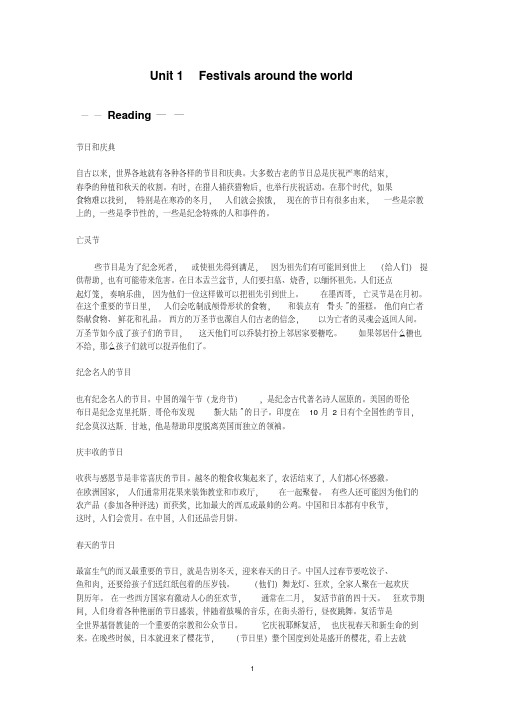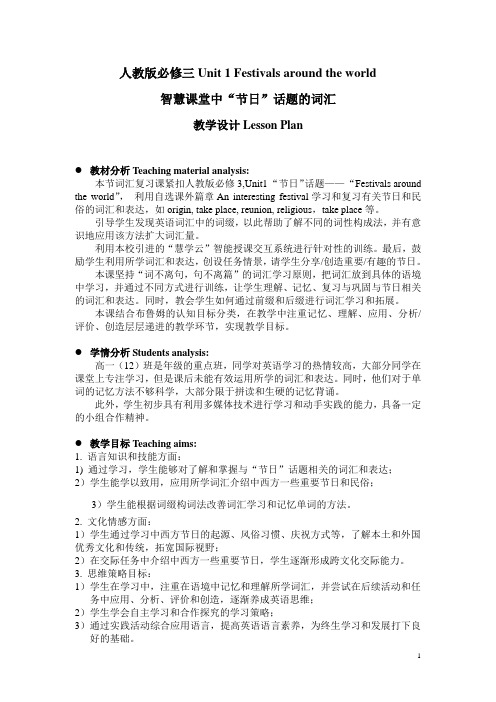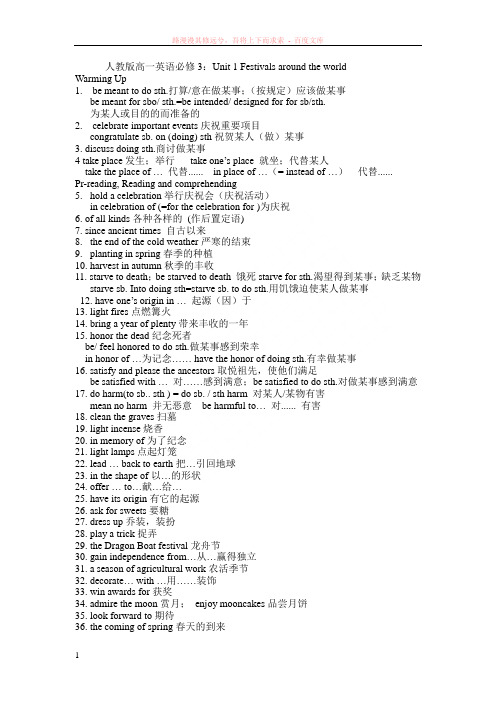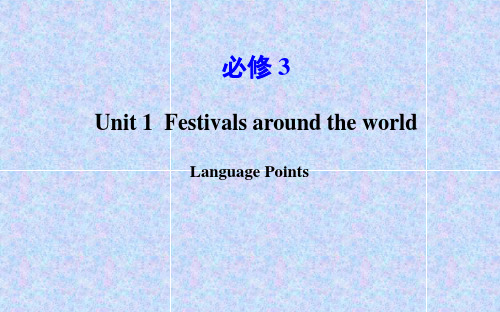人教版英语必修三 Unit 1 Festivals around the world 单元测试 (含答案)
人教版高中英语必修三课文翻译

Unit 1 Festivals around the world ——Reading ——节日和庆典自古以来,世界各地就有各种各样的节目和庆典。
大多数古老的节日总是庆祝严寒的结束,春季的种植和秋天的收割。
有时,在猎人捕获猎物后,也举行庆祝活动。
在那个时代,如果食物难以找到,特别是在寒冷的冬月,人们就会挨饿,现在的节日有很多由来,一些是宗教上的,一些是季节性的,一些是纪念特殊的人和事件的。
亡灵节些节目是为了纪念死者,或使祖先得到满足,因为祖先们有可能回到世上(给人们)提供帮助,也有可能带来危害。
在日本盂兰盆节,人们要扫墓、烧香,以缅怀祖先。
人们还点起灯笼,奏响乐曲,因为他们一位这样做可以把祖先引到世上。
在墨西哥,亡灵节是在月初。
在这个重要的节日里,人们会吃制成颅骨形状的食物,和装点有“骨头”的蛋糕。
他们向亡者祭献食物、鲜花和礼品。
西方的万圣节也源自人们古老的信念,以为亡者的灵魂会返回人间。
万圣节如今成了孩子们的节目,这天他们可以乔装打扮上邻居家要糖吃。
如果邻居什么糖也不给,那么孩子们就可以捉弄他们了。
纪念名人的节目也有纪念名人的节目。
中国的端午节(龙舟节),是纪念古代著名诗人屈原的。
美国的哥伦布日是纪念克里托斯.哥伦布发现“新大陆”的日子。
印度在10月2日有个全国性的节目,纪念莫汉达斯.甘地,他是帮助印度脱离英国而独立的领袖。
庆丰收的节日收获与感恩节是非常喜庆的节目。
越冬的粮食收集起来了,农活结束了,人们都心怀感激。
在欧洲国家,人们通常用花果来装饰教堂和市政厅,在一起聚餐。
有些人还可能因为他们的农产品(参加各种评选)而获奖,比如最大的西瓜或最帅的公鸡。
中国和日本都有中秋节,这时,人们会赏月。
在中国,人们还品尝月饼。
春天的节日最富生气的而又最重要的节日,就是告别冬天,迎来春天的日子。
中国人过春节要吃饺子、鱼和肉,还要给孩子们送红纸包着的压岁钱。
(他们)舞龙灯、狂欢,全家人聚在一起欢庆阴历年。
在一些西方国家有激动人心的狂欢节,通常在二月,复活节前的四十天。
人教高中英语 必修3 unit1 Festivals around the world

各种各样的 相同种类的 不同种类的 这(那)种 某种
① 我们卖各式各样的鞋。 We sell all kinds of shoes.
= We sell shoes of all kinds. ②那类问题是很难解答的。
That kind of questions is very difficult to answer. = Questions of that kind are difficult to answer.
I mean the room for my bedroom. had meant to 本来打算做 I had meant to do English exercises first.
---You should have thanked her before you left.
---I meant __B___, but when I was leaving I couldn’t find her anywhere.
take place与happen take place:发生,举行;侧重安排或计划 而发生的事,带有“非偶然”的意思。
The Olympic Games take place every four years. happen:常指客观事物或情况偶然、不 可预料地发生。(happen to … 碰巧发生)
A. to do B. to C. doing D. doing so
想一想
2.take place发生,举行
<不及物动词,不用于被动语态> Our school sports meeting will take place next
week. Great changeds have takent. (1) 庆祝;祝贺
人教版高中英语必修三Unit1Festivalsaroundtheworld

人教版必修三Unit 1 Festivals around the world智慧课堂中“节日”话题的词汇教学设计Lesson Plan●教材分析Teaching material analysis:本节词汇复习课紧扣人教版必修3,Unit1 “节日”话题——“Festivals around the world”,利用自选课外篇章An interesting festival学习和复习有关节日和民俗的词汇和表达,如origin, take place, reunion, religious,take place等。
引导学生发现英语词汇中的词缀,以此帮助了解不同的词性构成法,并有意识地应用该方法扩大词汇量。
利用本校引进的“慧学云”智能授课交互系统进行针对性的训练。
最后,鼓励学生利用所学词汇和表达,创设任务情景,请学生分享/创造重要/有趣的节日。
本课坚持“词不离句,句不离篇”的词汇学习原则,把词汇放到具体的语境中学习,并通过不同方式进行训练,让学生理解、记忆、复习与巩固与节日相关的词汇和表达。
同时,教会学生如何通过前缀和后缀进行词汇学习和拓展。
本课结合布鲁姆的认知目标分类,在教学中注重记忆、理解、应用、分析/评价、创造层层递进的教学环节,实现教学目标。
●学情分析Students analysis:高一(12)班是年级的重点班,同学对英语学习的热情较高,大部分同学在课堂上专注学习,但是课后未能有效运用所学的词汇和表达。
同时,他们对于单词的记忆方法不够科学,大部分限于拼读和生硬的记忆背诵。
此外,学生初步具有利用多媒体技术进行学习和动手实践的能力,具备一定的小组合作精神。
●教学目标Teaching aims:1. 语言知识和技能方面:1) 通过学习,学生能够对了解和掌握与“节日”话题相关的词汇和表达;2)学生能学以致用,应用所学词汇介绍中西方一些重要节日和民俗;3)学生能根据词缀构词法改善词汇学习和记忆单词的方法。
人教版高中英语必修3-Unit 1 Festivals around the w

教师姓名梁晓莉单位名称新疆昌吉玛纳斯
县第一中学
填写时间2020年8月31日学科英语年级/册高一教材版本人教版
课题名称人教版高中英语必修3 Unit 1 Festivals around the world( Four Traditional Chinese Festivals)难点名称Introduce some important festivals
难点分析从知识角度分析
为什么难以往的英语语言学习中对节日的概念和细节方面的划分及其理解没有深入的接触过,同时对于相关词汇也没有特定的展示。
难点教学方法 1.通过背景知识了解以及结合生活实际
2.通过讨论及分享,表达对于节日的深层挖掘。
教学环节教学过程导入介绍节日的来源和大致类别。
知识讲解(难点突破)以中国传统四大节日Spring Festival、Tomb- sweeping day、Dragon-boat festival以及the Mid-autumn day为例,从其特点、风俗 、饮食等方面,结合PPT展示及重点文字说明,帮助学生对节日的起源和类别以及背后的文化意义达成更深层次的认知。
课堂练习
(难点巩固)
Think & share:What other festivals do you know?
小结
本节课设计的初衷是为配合人教版高中英语必修三unit1 Festivals around the world单元知识教学的文化背景学习,也可以当作warming-up部分进行配合使用。
人教版高中英语(必修3)unit1festivalsaroundtheworld

人教版高一英语必修3:Unit 1 Festivals around the worldWarming Up1.be meant to do sth.打算/意在做某事;(按规定)应该做某事be meant for sbo/ sth.=be intended/ designed for for sb/sth.为某人或目的的而准备的2.celebrate important events庆祝重要项目congratulate sb. on (doing) sth祝贺某人(做)某事3. discuss doing sth.商讨做某事4 take place发生;举行take on e’s place 就坐;代替某人take the place of …代替...... in place of …(= instead of …)代替......Pr-reading, Reading and comprehending5.hold a celebration举行庆祝会(庆祝活动)in celebration of (=for the celebration for )为庆祝6. of all kinds各种各样的(作后置定语)7. since ancient times 自古以来8.the end of the cold weather严寒的结束9.planting in spring春季的种植10.harvest in autumn秋季的丰收11. starve to death;be starved to death 饿死starve for sth.渴望得到某事;缺乏某物starve sb. Into doing sth=starve sb. to do sth.用饥饿迫使某人做某事12. have one’s origin in …起源(因)于13. light fires点燃篝火14. bring a year of plenty带来丰收的一年15. honor the dead纪念死者be/ feel honored to do sth.做某事感到荣幸in honor of …为记念…… have the honor of doing sth.有幸做某事16. satisfy and please the ancestors取悦祖先,使他们满足be satisfied with …对……感到满意;be satisfied to do sth.对做某事感到满意17. do harm(to sb.. sth ) = do sb. / sth harm 对某人/某物有害mean no harm 并无恶意be harmful to…对...... 有害18. clean the graves扫墓19. light incense烧香20. in memory of为了纪念21. light lamps点起灯笼22. lead … back to earth把…引回地球23. in the shape of以…的形状24. offer … to…献…给…25. have its origin有它的起源26. ask for sweets要糖27. dress up乔装,装扮28. play a trick捉弄29. the Dragon Boat festival龙舟节30. gain independence from…从…赢得独立31. a season of agricultural work农活季节32. decorate… with …用……装饰33. win awards for获奖34. admire the moon赏月;enjoy mooncakes品尝月饼35. look forward to期待36. the coming of spring春天的到来37.give children lucky money in red paper用红包装着压岁钱给小孩38. dragon dances舞龙灯39. the lunar New Year阴历新年40.day and night整天;日夜41.colorful clothing of all kinds各种艳丽的衣服42. Christian countries信奉基督教的国家43. be covered with被…罩着44. as though好像45.love to get together to eat, drink and have fun with each other喜欢聚在一起吃、喝、玩耍have fun with sb. =enjoy oneself / have a good time with sb.与某人一起玩得愉快46.enjoy life享受生活47. forget our daily work for a little while暂时忘记日常生活中的烦恼Learning about language and using langbuage48. have a good time with和…一起开心49. at the parking lot在停车场50. be heart-broken心都碎了51. at the coffee shop在咖啡馆里;after work下班后52. turn up出现53. right now立刻54. keep one’s word守信用55. hold one’s breath屏气56. drown one’s sadness in coffee用咖啡来解愁57. wipe the table擦好桌子58. visit the earth下凡来到人间;(be) on earth在人间59. the herd boy牛郎60. set off for home动身回家61. remind sb. of …因…想起某人62.pass the tea shop on the corner路过在转角处的茶馆63. wave at sb. 向某人招手Workbook64. wipe all one’s tears拭去泪水;hide the sadness on one’s face掩盖住脸上的悲伤65. dream about going back to one’s homeland 日夜梦想回到祖国66. win the beat actor at the Golden Rooster Award 荣获金鸡奖的最佳男演员67.be ready for a second try准备第二次尝试68.leave sb. alone让某人一个人呆会69. full-time workers全职工70.have free time有时间71 ask for permission请求许可72.have an eye examination参加一个视力检测73.sit in a café坐在咖啡厅里74.32 degrees below freezing零下32度75. pile… up along the sidewalks沿着人行道把…堆起来76. ride in horse carriage乘座马车77.admire the ice sculptures欣赏冰雕78. be dressed in heavy clothes穿了厚厚的衣服。
人教版高考英语 必修3 Unit 1 Festivals around the world 知识点4

【拓展】补全下列由“breath”构成的短语
(be) _o_u_t/_s_h_o_r_t of breath
呼吸急促;喘不过气来;上
气不接下气
_c_a_tc_h_ one’ s breath
屏住气;歇口气
_lo_s_e_ one’ s breath
气喘吁吁;上气不接下气
Ⅰ. 用所给单词的适当形式填空 1. When Mary finally appeared, she made hera_p_o_l_o_g_ie_s_ቤተ መጻሕፍቲ ባይዱ(apologize) to Mrs Madrigal. 2. He was afraid of losing his _in_d_e_p_e_n_d_e_n_c_e_ (independent). 3. My father has much _b_e_li_e_f (believe) in doctors of traditional Chinese medicine. 4. The party was in _c_e_le_b_r_a_t_io_n_ (celebrate) of my parents’ silver wedding. 5. I was _t_ri_c_k_e_d_ (trick) into giving the old man some money.
①她一定会来参加讨论。 _It__is_c_e_r_t_a_in__th__a_t she will come to the discussion. ②我们不能走, 真遗憾。 _It__is_a__p_i_ty__th__a_t we can’t go. ③我突然想起前门未锁。 _It__o_cc_u_r_r_e_d__to__m_e__th__a_t I didn’t lock the front door. ④据报道他赢得了比赛。 _I_t_is__re_p_o_r_t_e_d__th_a_t_he has won the game.
人教版高中英语必修3 unit1 Festivals around the world 课件

Mexico
Halloween
western countries
Dragon Boat Festival
China
Festivals to Honor People
Columbus Day
USA
Festival to Honor Gandhi
India
Harvest Festivals
Thanksgiving
Unit 1 Festivals around the world
Spring Festival Christmas
Unit 1 Festivals around the world
Tibetan New Year
Unit 1 Festivals around the world
Task 1
Scanning
Easter and some western
carnivals
countries
Cherry Blossom Japan Festival
Kinds of Festivals
Names of Festivals
Countries
Obon
Japan
Festivals of the Dead
Day of the Dead
A. 生病 B. 发疯
C. 受伤 D. 挨饿
2.Which one is used to honour someone?
A. Spring Festival
B. Thanksgiving
C. Dragon Boat Festival
D. Mid-autumn Day
3. Which of the following is not mentioned?
人教版英语必修3 Unit1 Festivals around the world

Unit1 Festivals around the worldTeaching aims:1. TopicFestivals; how festivals begin; how to celebrate festivals2. Useful words and expressions:Starve plenty satisfy ancestor lamp lead feast bone origin trick poet arrival national gain independence gather agricultural European custom award watermelon handsome rooster admire energetic forward Easter clothing religious social Christian daily permission possibility fool apologise drown sadness obvious wipe lovely couple weep announcer forgiveTake place in memory of dress up play a trick look forward to day and night as though have fun with turn up keep one’s word hold one’s breath 3. Functional items:1)RequestCould /Would you please…?Could I have…?Could we look at…?I look forward to ….May I see…?2)ThanksIt’s very kind of you…Thank you very much/thanks a lot.I’d love to.It was a pleasure….Don’t mention it.You are most welcome.4. Structures情态动词can, could, may, might, will, would, shall, should, must, can’t 等的用法。
- 1、下载文档前请自行甄别文档内容的完整性,平台不提供额外的编辑、内容补充、找答案等附加服务。
- 2、"仅部分预览"的文档,不可在线预览部分如存在完整性等问题,可反馈申请退款(可完整预览的文档不适用该条件!)。
- 3、如文档侵犯您的权益,请联系客服反馈,我们会尽快为您处理(人工客服工作时间:9:00-18:30)。
Unit 1 Festivals around the world 单元测试姓名:__________ 班级:__________ 学号:__________一、单词拼写(共15题;共15分)1.She ________(哭泣)for the loss of her mother.2.He is an ________(精力充沛)boy, he enjoys sports.3.Our newspaper is a n ________ newspaper, which is popular among all the people.4.India gained ________ from Britain in 1947.(独立)5.She is ________ (擦) the table.6.Ever since he lost his son, he has done nothing but weep ________ (悲伤地) all day.7.How do people ________(庆祝)New Year in your country?8.Please ________(提醒)me of the time of setting off.9.This is not a copy but an ________(最初的)painting by Picasso.10.Columbus Day is meant to celebrate the ________(到达)of Christopher Columbus.11.We can't take photos here without ________ (允许).12.It is cruel to ________ (淹死) the cat in the river.13.You should ________ (道歉) to your teacher for coming late.14.It is my c________ to go for a walk every day before breakfast.15.He couldn't say a word because of his ________ (悲伤).二、完形填空(共20分)The spirits of givingTwo weeks before Christmas, two girls were walking down the street, laughing on some ice that remained from a recent snow. Merrily they shared what they hoped to 1 from Christmas.They stopped to talk to an old man named Harry, who was on his knees 2weeds around a large oak tree. He wore a pair of 3 garden gloves. His fingers were sticking out of the ends, blue from the 4 .Harry told them he was getting the yard in 5 as a Christmas gift for his mother, who had died several years before. He said with his eyes 6 with tears,"My mother was all I had. She loved her 7 and her trees, so I do this for her at Christmas."His words 8 the girls and soon they were down on their hands and knees helping him 9 around the trees. When they were finished, Harry pressed a quarter into each of their hands and said, "I wish I could 10 you more, but it's all I've got right now."The girls had often passed his house, and as they 11 on they remembered that the house was always 12 . No decorations to add cheerfulness were anywhere in sight. Harry sat behind curtain windows, looking 13 .The quarter in one little girl's palm(手心) seemed to burn a hole of guilt14 they walked on. The next day she called her friend and they 15 to put their quarters in a jar marked "Harry's Christmas Present". Then they began to seek out small jobs to 16 more. Every nickel, dime and quarter they earned went into the jar.Two days before Christmas, they had enough money to buy new 17 and a card. Christmas Eve found them 18 Harry's doorstep singing carols(圣诞颂歌). When Harry opened the door, they presented him with the gloves wrapped in pretty paper and a19 pumpkin pie a mother had just baked. With 20 hands he tore open the paper from the gloves, and then to their surprise, he held them to his face and wept.1. A. make B. prepare C. get D. ask2. A. pulling B. moving C. planting D. burning3. A. new B. torn C. beautiful D. worn4. A. work B. cold C. anxiety D. pain5. A. style B. fashion C. shape D. form6. A. closed B. opened C. blinked D. filled7. A. yard B. son C. house D. present8. A. scared B. touched C. threatened D. inspired9. A. look B. water C. weed D. show10. A. thank B. invite C. help D. pay11. A. walked B. talked C. continued D. argued12. A. messy B. shabby C. clean D. tidy13. A. dull B. silly C. lonely D. friendly14. A. though B. if C. because D. as15. A. agreed B. hoped C. managed D. attempted16. A. support B. earn C. receive D. give17. A. trousers B. glasses C. gloves D. socks18. A. in B. on C. with D. for19. A. sweet B. delicious C. warm D. fancy20. A. rough B. freezing C. thin D. trembling三、阅读理解(共2题;共18分)(一)Anger is not wrong.I know this statement seems shocking and challenges the wildly popular “Positive Thinking” movement,which encourages us to “be full of positive energy” and “let go of our anger”. However,the truth is that anger is just an emotion,and emotions are neither right nor wrong.We do not consciously choose them.We do,on the other hand,choose how we express our emotions and there are definitely right and wrong means of expression.The reason we're often urged to “keep_a_lid_on”our anger is that few people ever learn proper and positive ways to express anger.Instead,we are taught that “anger is wrong” and “you should keep your anger inside”.But these messages don't change the fact that,for most of us,anger exists.Many popular “Positive Thinking” programmes assume that success comes from “controlling our emotion” and that this can be done by simply repeating positive statements.Interestingly,these positive slogans often include a lot of negativity.“Only losers complain!I am a winner!” is one popular saying.The belief that those who disagree with us are losers is actually quite negative and is often used as an excuse for rude language and personal attacks.When it comes to dealing with negative situations in our daily lives,the ability to reasonably express anger or disagreement is an important skill.But we must use balanced and non-violent methods to express our dissatisfaction.Frustration at unfair policies or treatment can certainly cause anger,but our anger can never be an excuse for abusing family members,damaging schools,attacking doctors or most seriously,engaging in terrorism.Instead of pretending that anger doesn't exist,we should start teaching appropriate means of dealing with anger.When we experience anger feelings in ourselves or others,what we should “let go of” is the silly idea that we can remove anger with just a few sweet words.Instead,we should find reasonable solutions to the causes of those angry feelings.We need to accept anger as a naturalemotion but stop using it as an excuse for violent and destructive behavior.Anger isn't wrong,but failure to deal with it appropriately is.(1)What is the writer's opinion about the “Positive Thinking” movement?()A. It can help people control their negative feelings.B. It does not offer useful solutions for dealing with anger.C. Following such advice can improve people's chances for success.D. Most of the people who participate in such programs are dishonest.(2)The underlined expression “keep a lid on” in Paragraph 2 is closest in meaning to________.A. freely express B. always forgive C. hold inside D. completely forget (3)What information would have been useful to add to the final paragraph? ()A. The names of some good books that talk about anger issues.B. The viewpoints of people who hold the opposite opinion to the writer.C. Different studies that provide some evidence supporting the writer's belief.D. Some examples of how to deal with anger in a positive and beneficial way.(4)The content of this passage is mostly based on________.A. factB. opinionC. theoryD. story(二)There are a number of special days of the year that are celebrated in different countries. The origins of most of the days are unknown. They were certainly not created by individual people. Other days, however, especially those celebrated in western countries often owe their origins to a particular person. One of the most popular of these, even though it is fairly recent, is Mother's Day. Mothers have always been highly regarded in all cultures. The ancient Romans had a festival known as Hilaria, during which children took presents to the temple of the “Mother of the Gods”. TheChristian Church adopted this idea and called it Mothering Sunday. However, over the years this custom was gradually forgotten, and almost disappeared by the end of the 19th century.Born in 1864 in Virginia, US, Anna Jarvis was a school teacher and believed children should show gratitude(感激) to their mothers for all their love and care. Encouraged by a friend, she wrote to thousands of important people—politicians, churchmen, doctors, city officials and asked them to support her idea:a special day of the year for thanking mothers.In 1910 the Governor of Western Virginia introduced Mother's Day in the state. The date chosen was May 10 — the second Sunday in May, which is still observed in America today. This date was chosen because May 10 was the date on which in 1908 Anna Jarvis's mother died. In 1914 President Woodrow Wilson made May 10 the official date for Mother's Day throughout the United States.Soon there was a Mother's Day International Association and the custom began to be adopted in many countries of the world.Anna Jarvis, a sad and disillusioned (幻想破灭的) woman died in 1948.The custom she had worked so hard to establish and which had become almost universal had lost its original purpose. It had been taken over by business. As with Christmas, the giving of presents and the sending of cards had become a multi-million dollar industry.(1)The passage mainly tells us________.A. how Mother's Day came into beingB. how people celebrate Mother's DayC. a woman named Anna JarvisD. President Wilson and Anna Jarvis(2)Hilaria was a festival in________.A. AsiaB. AmericaC. Ancient RomeD. the Christian Church (3)Anna Jarvis intended to establish a festival for mothers because________.A. her students had nothing to doB. she wanted to know important people in this wayC. she wanted to do something for mothersD. she wanted people to thank their mothers (4)May 10 became the date for Mother's Day because____.A. May 10 was the date on which Anna Jarvis's mother diedB. it was the second Sunday in May in 1910C. May 10 is a lucky dayD. President Wilson like the date(5)The underlined word “observed” in Paragraph 3 most probably means________.A. watchedB. followedC. ruledD. set四、任务型阅读(共5分)The Qingming Festival is celebrated with a three-day national holiday, whose name originates from the saying "Plants start to revive and prosper at Qingming in a clean and bright way. Thus, the festival is called Qingming,," which means clean and bright.________Tomb sweeping aims to commemorate family ancestors while going on a spring outing allows everyone the chance to enjoy the beautiful scenery and enjoy the season.Traditional customsTomb sweeping.________On this day, the whole family gathers in front of their ancestral tombs. They offer fruit and wine to their ancestors and clean the weeds from around the tomb. Finally, they kowtow and pray, hoping for their ancestors' blessing for the rest of the year.Spring outing. The time around the Qingming Festival is one of the most suitable seasons for a spring outing, as plants are thriving and flowers are blooming. People can have a great time outdoors with their friends and family. ________Traditional foodQingtuan, a green rice ball tiny enough to fit into your hand, is also called Qingmingguo or Aiguo.________It is a mixture of sticky rice powder and green vegetable juice, stuffed with sweetened bean paste, Qingtuan tastes sweet with the fresh fragrance of Aicao, a green spring vegetable, In celebration of Qingming, people from Shaanxi make steamed buns, known as Huamo, made into different shapes.________Some are for peaceful family life while others represent the wish for health.A. With each distinct look comes a good blessingB. Playing football and flying kites are popular activities.C. It is popular in the southern regions of the Yangtze River.D. Family members gather together to celebrate and taste the food.E. The tradition of tomb sweeping originates from the Qin Dynasty.F. Many traditional customs are practiced to show respect for our ancestors.G. The two main activities over the festival include tomb sweeping and going on a spring outing.五、翻译(共10分)1.他站在山顶欣赏大自然的美景。
